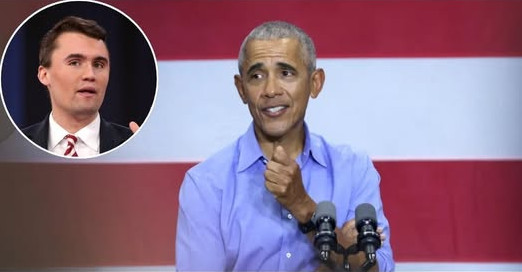The Political Fallout from Charlie Kirk’s Tragic Death
The recent assassination of conservative figure Charlie Kirk has ignited a fierce political confrontation within the U.S. House of Representatives, revealing the deep ideological rifts that characterize American politics today. As lawmakers on both sides of the aisle scrambled to respond to the tragedy, the event quickly spiraled into a bitter partisan clash. Republicans and Democrats alike sought to assign blame for the circumstances surrounding Kirk’s death, highlighting the pervasive tensions that have escalated in recent years. This incident serves as a pivotal moment, shedding light on the increasingly hostile political climate that has emerged in the United States.
Adding fuel to the fire, former President Barack Obama weighed in on the incident, expressing uncertainty about the motives behind Kirk’s assassination. In a statement posted on the social media platform X, Obama stated, “We don’t yet know what motivated the person who shot and killed Charlie Kirk, but this kind of despicable violence has no place in our democracy.” While many praised his condemnation of violence, conservative commentators seized the opportunity to criticize Obama, framing his remarks as a refusal to acknowledge the broader societal factors that may have influenced such tragic acts. This reaction is emblematic of the current state of discourse, where even well-intentioned statements can be weaponized for political gain.
One of the most vocal critics was Clay Travis, founder of OutKick, who appeared on Fox News to voice his frustrations. Travis accused Obama of contributing to a culture of instability through a recurring narrative that labels Trump supporters as extremists. “You can’t call the president of the United States Adolf Hitler for 10 years and then act shocked when someone tries to violently attack his supporters,” he argued passionately. This sentiment reflects a growing discontent among conservatives who feel increasingly marginalized and demonized in contemporary political discourse. The use of extreme language has become a contentious topic, with many advocating for a more measured approach to political commentary.
The historical context of political rhetoric in the United States adds layers to this ongoing debate. In 2016, Obama was reported to have described Trump as a “fascist” during a private conversation with Hillary Clinton’s running mate, Tim Kaine. This labeling has been leveraged by conservatives to illustrate a pattern of extreme rhetoric from left-leaning politicians, which they argue has further polarized the political landscape. By framing political opponents in stark and extreme terms, critics contend that these leaders inadvertently contribute to an environment where violence seems like a viable option for the disenchanted and unstable. This trend is not new; political rhetoric has often reflected the societal tensions of its time, yet the current climate appears particularly charged.
Travis did not shy away from citing specific examples to reinforce his argument. He pointed to the arrest of Ryan Wesley Routh, a man who attempted to assassinate Trump, claiming that he viewed the former president as a modern-day Hitler. “This left-wing violence—it’s out of control,” Travis stated. “Charlie Kirk tragically bore the brunt of that left-wing aggression.” His comments underscore a belief among some conservatives that the violent actions of a few individuals can often be traced back to the incendiary rhetoric prevalent within political discourse. This claim resonates with many who argue that unchecked political language can have dire consequences, making the need for accountability more pressing than ever.
The discourse surrounding Kirk’s death has highlighted the polarized nature of American political conversation. On one side, Democrats emphasize the need for a universal condemnation of violence, irrespective of political affiliation. They argue that all forms of aggression must be unequivocally denounced, as it poses a threat to the democratic ideals that the nation stands for. Conversely, Republicans contend that the escalation of political tensions can be attributed to decades of incendiary language from prominent figures on the left—a dynamic that has fostered a culture where political disagreements can devolve into violent confrontations. This ongoing debate reveals the complexities of addressing violence in politics, as both sides grapple with their narratives and responsibilities.
As the nation grapples with the shocking implications of Charlie Kirk’s assassination, discussions of political accountability and the influence of rhetoric on public sentiment remain at the forefront of national dialogue. The incident serves as a stark reminder of how language and narrative can shape perceptions and, in extreme cases, incite dangerous actions. This tragic event has not only reignited debates about political violence but also calls into question the responsibilities of public figures and media in shaping a discourse that promotes understanding rather than division. The hope is that through reflection and dialogue, there can be a movement toward a more respectful and constructive political environment.
Moreover, the implications of Kirk’s assassination extend beyond immediate political reactions; they challenge the fundamental principles of democracy and public discourse. The fabric of American society is woven from diverse viewpoints, and the ability to engage in civil discourse is essential for a functioning democracy. The fear is that as rhetoric becomes more extreme and divisive, the likelihood of violence will increase, further entrenching the political divide. In this context, the role of education in fostering critical thinking and respectful dialogue cannot be overstated, as it may serve as a counterbalance to the toxic political environment.
Looking ahead, it is crucial for political leaders and the public alike to prioritize dialogue over division, understanding over hostility. The tragic loss of Charlie Kirk should serve as a catalyst for introspection and change within the political landscape. By recognizing the power of words and the responsibilities that come with public influence, there is hope for a shift toward a more constructive political environment, where differences are navigated with respect and empathy, rather than hostility and aggression. Ultimately, the legacy of this event could be a renewed commitment to safeguard the principles of democracy against the corrosive effects of violence and divisive rhetoric.

















